Rohinton Mistry - Tales From Firozsha Baag
Здесь есть возможность читать онлайн «Rohinton Mistry - Tales From Firozsha Baag» весь текст электронной книги совершенно бесплатно (целиком полную версию без сокращений). В некоторых случаях можно слушать аудио, скачать через торрент в формате fb2 и присутствует краткое содержание. Год выпуска: 2006, Издательство: Faber & Faber, Жанр: Современная проза, на английском языке. Описание произведения, (предисловие) а так же отзывы посетителей доступны на портале библиотеки ЛибКат.
- Название:Tales From Firozsha Baag
- Автор:
- Издательство:Faber & Faber
- Жанр:
- Год:2006
- ISBN:нет данных
- Рейтинг книги:3 / 5. Голосов: 1
-
Избранное:Добавить в избранное
- Отзывы:
-
Ваша оценка:
- 60
- 1
- 2
- 3
- 4
- 5
Tales From Firozsha Baag: краткое содержание, описание и аннотация
Предлагаем к чтению аннотацию, описание, краткое содержание или предисловие (зависит от того, что написал сам автор книги «Tales From Firozsha Baag»). Если вы не нашли необходимую информацию о книге — напишите в комментариях, мы постараемся отыскать её.
Tales From Firozsha Baag — читать онлайн бесплатно полную книгу (весь текст) целиком
Ниже представлен текст книги, разбитый по страницам. Система сохранения места последней прочитанной страницы, позволяет с удобством читать онлайн бесплатно книгу «Tales From Firozsha Baag», без необходимости каждый раз заново искать на чём Вы остановились. Поставьте закладку, и сможете в любой момент перейти на страницу, на которой закончили чтение.
Интервал:
Закладка:
That day, Khorshedbai and Ardesar went directly from the courthouse to the agyaari , and made an offering of a ten-rupee sandalwood log instead of the regular fifty-paise stick. She was ebullient by the time they reached home. She washed and wiped the photoframes containing the moustached and pugreed countenances of her forefathers on the Other Side, as well as the cage, and filled fresh water in the drinking pan. Then, all evening long she lit sticks of agarbatti before the photoframes and cage, wreathing her departed ones in a fog thicker than the one they must have encountered when crossing Chinvad Bridge to the Other Side.
The heavy incense began to spread. It strayed into the other room and nauseated Kashmira and Boman. It filled their pots and pans and destroyed their appetites; lingered over bedsheets and slunk inside pillowcases; slipped through the slats and squatted under their bed. The relentless and pungent scent insinuated itself into their eyes and noses, and swam boldly through their skulls, muddling their minds and curdling their senses, until Khorshedbai had taken possession of their flat and their beings. Little Adil complained about the smell too. They calmed him down and put him to bed early, then retired, nursing headaches and shame and disappointment.
But Khorshedbai denied them the balm of sleep. When silence had fallen beyond the wall, she wound up her gramophone. She pointed the horn towards the region where the beds would be on the other side, and played the only record that she possessed. The only record, as she told Ardesar whenever he wanted to augment the collection, that anyone need possess. The strains of Sukhi Sooraj , the stridulant paean to the rising sun, borne on the vocal cords of the shrill woman buried in the crackling, hissing grooves of the 78’s shellac, journeyed beyond the wall and into the darkness where Boman and Kashmira had sought refuge. They clung together, helpless, soothing each other’s pain through repeated playings.
Then the horn was folded away. The last sticks of agarbatti smouldered into diminutive tapers. And when Khorshedbai finally felt sleep overpowering her, she struggled against it, unwilling to let the day’s blessed events cease their circuit of her mind. Such were her stars, though, that when sleep did triumph, it only brought more joy. Pestonji visited, and whistled, and fluttered through her sleeping hours.
In the morning she remembered the dream distinctly: Pestonji was sitting in his large rectangular custom-built cage which, for some reason, was out on the veranda. She brought him peanuts. Pestonji proceeded to crack them methodically and thoroughly, then tossed the shells and nuts out of the cage. He threw them all out. Very surprising, because Pestonji had always been a neat and tidy parrot, he even did his potty in one corner of the cage only, never let fly haphazardly like others. Maybe he was not in the mood for peanuts. So she gave him two peppers. Long green ones. He did the same thing again. Tore them into little pieces, threw them across the length and breadth of the veranda.
It was only then that she understood Pestonji’s message.
And while she was preparing the first of her veranda parcels, guided by the divine afflatus from Pestonji, Boman awoke, his confidence renewed. He told Kashmira there was no need to worry, he would get rid of the paying guests one way or another. He whistled as he lingered over the selection of a tie. When the knot turned out perfect at the first attempt, his self-assurance was fully restored. He kissed Kashmira and left for work, urging her to continue with their locked-door policy. And in the evening he discovered Khorshedbai’s revenge scattered over the veranda.
Boman and Kashmira decided to pretend that nothing was wrong. They went out with a broom and dustpan. She swept away the garbage. He whistled as insouciantly as he could. She hummed along. He maintained a protective stance in the doorway. His tie and jacket gleamed like talismans of civility amidst Khorshedbai’s manufactured squalor. He always returned from work as crisp and neat as he left in the morning. Kashmira loved this about him, she used to say he made their room classy the minute he walked in; at night he would delay changing into pyjamas for as long as possible.
Khorshedbai watched with satisfaction through the crack in the door. The beaks lifted against her had been humbled and turned away without a single peck. She said to Ardesar, “Look at him standing chingo-mingo in his fancy dress, making his pregnant wife clean it.” Ardesar barely heard her. The pigeons were cooing and feeding from his hands, the occasional flutter of their wings fanning his face.
Days went by, then weeks. The veranda littering entered its second month, and Kashmira approached her ninth. She said, “What is going to happen now, Bomsi, how much longer?” He reassured her that he was making a plan.
“Not like the plan you made that time, I hope. Talking big, that you would scare them with a lawyer.”
“Don’t worry, Kashoo darling,” he soothed, “this one will be perfect.” He blamed her bitter reproach on the pregnancy. But the truth smarted.
That night he lay in bed unable to sleep. The paying guests were on his mind. Nowadays, it was the only thing he thought about. What was going to happen? He couldn’t admit there wasn’t a plan and upset her. He turned over on his right side and stretched out his legs. A few moments later he folded them up into his stomach. Still not comfortable. He straightened them again. It was no use. He turned over on his left side, rose on one elbow, and adjusted the pillow. Kashmira said to please lie quietly if he couldn’t sleep, and at least let her, she was worn out with the housework and the extra sweeping every evening, and it wouldn’t be long before five o’clock struck and Khorshedbai wound up her gramophone.
What Boman did not have a shred of before the case concluded, he now had in abundance: evidence to evict the paying guests. On grounds of extreme hardship, harassment, harmful influences, something like that — the odious lawyer had quoted sections and paragraphs, finger in nose. Now he needed some way to package it for presenting to the court. Witnesses, of course. Hardly anyone in Firozsha Baag was unaware of Khorshedbai’s doings on the veranda. Those who had not seen had at least heard of them. Those who wanted to see could walk past B Block at eleven o’clock.
He spoke to Mr. Karani first. Boman had expected more support from him during these difficult months. But each time they met, Mr. Karani, clutching his brief case and leaning on his umbrella, stood in the compound and droned on about the black market or the latest government swindle. The closest he let himself get to Boman’s domestic dilemma was when he politely inquired about Kashmira’s health.
Now Boman confronted him with his proposal.
“There is one principle in my life, Boman dikra,” said Mr. Karani, “which I never transgress: the three-monkeys principle.” He mimed, placing his hands over his eyes, ears, and mouth. “Besides,” he said, “the Mrs. would never let me be a witness. Ever since that tamaasha in the Baag about Jaakaylee and the ghost they saw, and the rubbish that people were talking about crazy ayah and crazy bai , she pinched her ears and swore, and made me do the same, to have nothing to do with these lowbreds and churls in Firozsha Baag.” Realizing what he’d just said, he embarrassedly patted Boman’s shoulder: “She didn’t mean you, of course, but it is a principle, you understand.” He winked and gave him the from-one-man-to-another look: “Always obey the Mrs. My motto is: be cowardly and be happy, try to be brave and you’re soon in the grave.”
Читать дальшеИнтервал:
Закладка:
Похожие книги на «Tales From Firozsha Baag»
Представляем Вашему вниманию похожие книги на «Tales From Firozsha Baag» списком для выбора. Мы отобрали схожую по названию и смыслу литературу в надежде предоставить читателям больше вариантов отыскать новые, интересные, ещё непрочитанные произведения.
Обсуждение, отзывы о книге «Tales From Firozsha Baag» и просто собственные мнения читателей. Оставьте ваши комментарии, напишите, что Вы думаете о произведении, его смысле или главных героях. Укажите что конкретно понравилось, а что нет, и почему Вы так считаете.












